
With all the digital tools and apps available, customers can more easily provide feedback on your products or services so you need to be prepared. If you want a successful business today, you need a solid online reputation management strategy. In this article and video on our most recent webinar, you’ll learn from an expert exactly how to do this.
What Is Online Reputation Management?
Online reputation management (ORM) is the practice of improving how potential customers perceive your business. It involves identifying online resources that potential customers may use to learn more about your business. ORM also requires taking certain steps to make sure that those particular resources help put your business in a positive light.
Essentially, the goal of online reputation management is to grow your customer base and increase your revenue. Contrary to what some may say, it doesn’t have to be overly expensive. If you’re a savvy business owner or marketer and you take our advice, you’ll be able to manage your online reputation more effectively even on a smaller budget.
Why Are Online Reviews So Important?
More customers are sharing their experiences and provide feedback online which can easily influence others. Research has shown that more consumers are reading online reviews and ratings before they decide where to shop, eat, stay and visit among others.
It’s no secret that online reviews have become one of the most trusted sources of information for consumers. The statistics speak for themselves as 97% of shoppers who read online reviews from other consumers also read the business responses.
You could have the greatest marketing team and biggest budget but people are always going to trust what others say about your company. A good online reputation starts by making sure the perception others have of your brand is positive.
The Elements Of Online Reputation Management
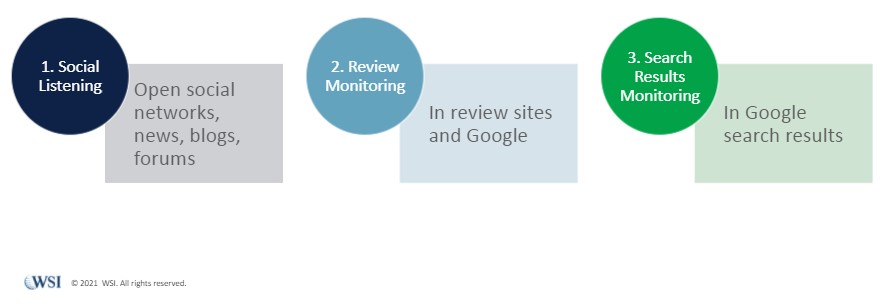
Online reputation management is one of the most important elements of building brand trust and credibility. If done correctly, it can positively impact your revenue but if you don’t, it can just as easily have a negative effect. Your online reputation can be your biggest asset or your worst liability so you want to get it right the first time.
As mentioned earlier, a positive online reputation will encourage awareness, credibility, and trust. It can also help increase sales and revenue but a bad reputation can lead to losing relationships, fewer opportunities and even business failure. To build a solid online brand reputation, you need to focus on each of these three key areas.
Social Listening And Brand Mentions
Brand monitoring is the process of tracking publicly available mentions about your brand, service, or product. The number of channels and Internet users makes it hard to manually follow every mention of your brand so you need the right tools to spot and analyse brand mentions.
Reputation or brand monitoring includes routine evaluations of social media platforms, looking at search engine results (Google rankings), and tracking relevant mentions in the press. The entire process is centralised around continually assessing the way people perceive you online.
Recommended: ‘How To Monitor Social Media Mentions’
Brand Monitoring (Review Sites)
This process involves tracking reviews about your brand, service, or product on specific sites such as Google, Angie’s List, Better Business Bureau, Yelp, TripAdvisor and similar. You need to measure the volume of mentions or reviews, track the sentiment or score, sources and cloud terms and identify influencers.
Most review sites will allow you to get data so you can take the necessary steps and make more informed decisions. It may look something like this:
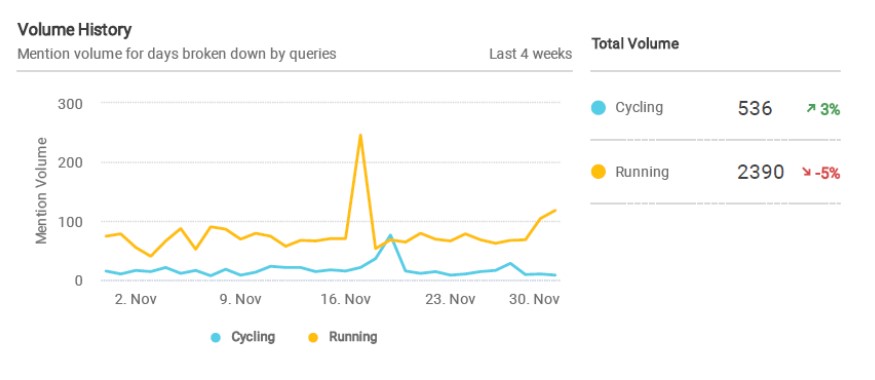
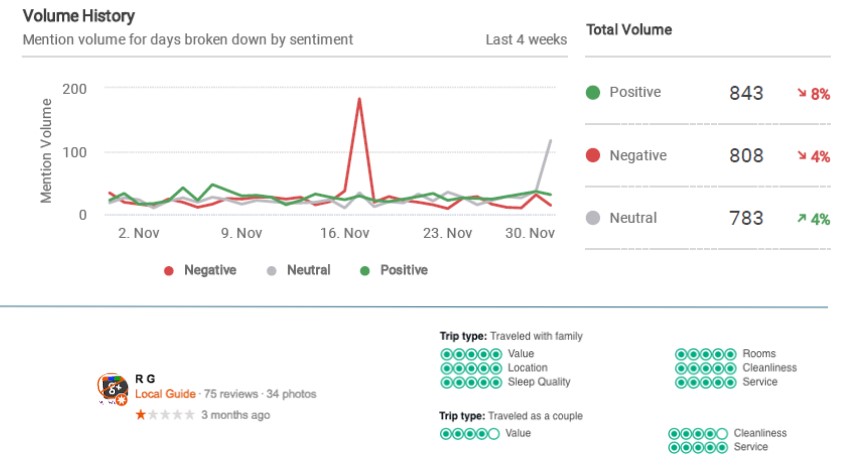
Reputation Management in Google Search Engine Results Pages
Search Engine Reputation Management (SERM) is the process of controlling what shows in the Search Engine Results Page about a company and brand. It also involves weakening or eliminating the negative material found online by replacing it with more positive information. Getting your strategy right for Google is vital and involves the following:
- Maintain a good SEO presence and dominate the top spot of your branded searches with good quality content
- Move negative reviews out of the first search results page (SERP) and replace them with positive information
- If Google showcases a negative review for your branded search query, you need to optimise and cleanse Google
Your job is to find all the comments and reviews and react appropriately. Where possible, spot a potential crisis before it escalates and make sure to respond quickly to all negative and positive posts. Here are some of the top tools you should look at.
Social Listening Tools
Monitoring Tools
Review Monitoring And Management Tool
Why Should You Respond To Comments, Queries Or Complaints?
Customers expect exceptional service at all times and that goes beyond the store itself. If you respond to your page comments, good or bad, customers will see that you pay attention and care about what they say. It’s the only way to retain or increase followers, engagement, customer interactions and boost SEO.
Have a look at these fascinating statistics and you will see why so many brands are taking the time to improve their online reputation management strategy.
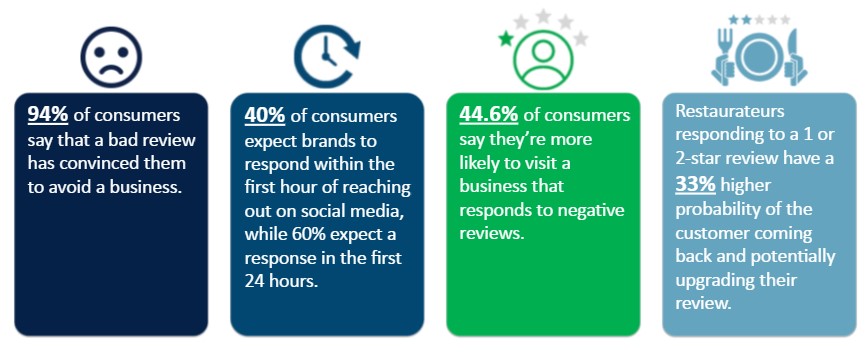
How Should You Respond to Negative Reviews?
Negative reviews don’t have to be bad as they can actually increase your credibility. Most consumers like to see a mix of good, moderate, and bad reviews. Interestingly, research from Harvard Business School has found that moderate positive reviews are often more persuasive than excessively positive reviews. The secret is how you handle negative reviews and these tips will certainly help:
- Don’t take it personally
- Don’t try to argue, empathise and address the reviewer
- Say thank-you
- Apologise, sympathise, and take responsibility
- Make things right by resolving or addressing the issues
- Take the issue offline
- Go the extra mile and ask for a second chance
The best way to prepare for negative reviews is by responding promptly and assigning ownership of the process. Publish an internal response policy, empower the people responding and implement a tracking system to address all negative reviews.
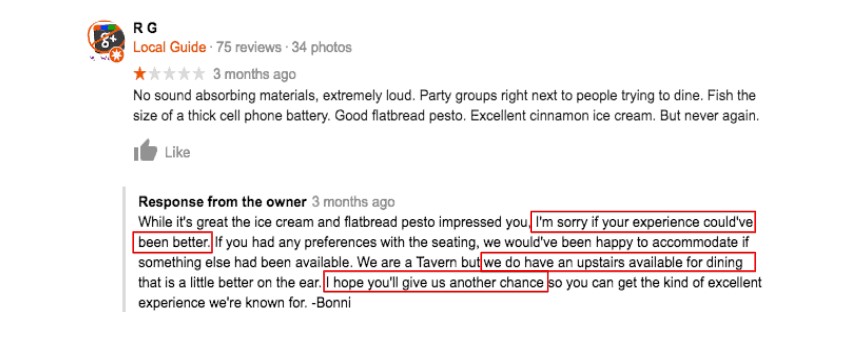
How To Respond To Positive Reviews
As we’ve established, today’s customers check the company before using its offer even if they’re going to do it offline. They don’t look only for the product descriptions but also want to know the opinions of other clients. Remember, responding to a positive review can open the door to new opportunities so make sure you do the following:
- Say thank you
- Reinforce the positive
- Pass along the compliment and share it with your team
- Tell customers you’d love to see them again
- Mention other products or services
- Share the review with the world
For more examples and expert advice on building positive reviews, watch the video and download the slides. They’re filled with helpful tips and you’ll discover all the benefits of review monitoring, search reputation and social listening.
How To Get Positive Reviews And Ensure A Good Online Reputation
When it comes to business reputation management, you have to index your website first and foremost. The goal is to own the top results when potential customers search for your business and the only way of doing that is with a good website, SEO optimised content and an active social media presence, including Google My Business. For a more detailed look into SEO fundamentals, have a look at this guide.
To make sure visitors like what they see, come back for more, refer their friends and leave a positive review, make sure you check all of these boxes.
- Monitor your brand
- Design a user-friendly website
- Show your expertise and your authority through a blog
- Be active in social media
- Reply to every question or opinion
- Share your achievements and awards
- Keep your content simple
Online Reputation Management Conclusion
Online reputation management is not rocket science but it’s not a walk in the park either. Truth is, the process can be challenging as it requires time, effort, technology and some resources. Step one is to identify the online resources that potential customers use to learn about your business which is often Google, Google My Business, Facebook and Yelp.
Step two involves taking steps to ensure that those online resources put your business in a positive light. Whilst we can’t do that for you here, WSI-eMarketing does specialise in online reputation, SEO, social media, PPC and content marketing.
So, if you need help with your online reputation management strategy or want to build significant brand trust and credibility online, give us a call on 01453 542761 or request a free consultation.
Related Post
Getting the Most from your...
LinkedIn is not only the most popular social network for professionals but with more than...
- November 22, 2012
- By Nadine Thomas
- Linked In
How One Business Saw Its...
Anyone who has ever been in business will know that things don’t always go according to...
- July 16, 2013
- By Rob Thomas
- Customer Reviews
6 tips for creating good...
It wasn’t so long ago that the majority of internet socialites were using MySpace and...
- September 27, 2013
- By Rob Thomas
- Content Marketing
7 Ways To Create Sustainable...
Engagement is all part of being social. Whether it’s an online or offline situation,...
- November 29, 2013
- By Rob Thomas
- Digital Marketing
A business strategy...
I’m always surprised when a business owner tells me that they don’t have a business...
- August 13, 2014
- By Nadine Thomas
- Business Growth
Pinterest For Small Business
I’m a small business, why do I need Pinterest? A common question I am asked, the answer...
- September 15, 2014
- By Mandy Baldwin
- Business Growth












Leave a Comments